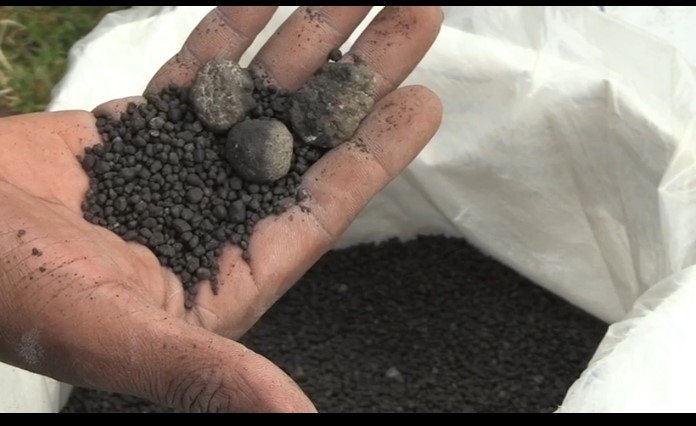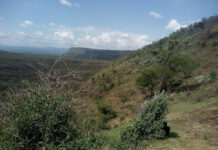
By Emanuel Kipkorir Tarus, DevReporter, Trans Nzoia County

Agricultural transformation and inclusive growth are one of the twelve elements of the Kenya Kwanza Bottom-Up Economic Transformation Agenda. Fertilizer subsidy is one of the ways the government is using to achieve transformation in the agricultural sector.
In 2023, the country harvested approximately 61 million bags, up from 44 million bags in 2022, an increase attributed to the ambitious fertilizer subsidy programme. However, this may not be the case this planting season due to delayed distribution of subsidised fertilizer and the infiltration of fake fertilizer.
“I bought Stones”
Oscar Barasa, a farmer from Maliki in Kiminini constituency, bought nine bags of fertilizer and when he went to plant, he realised he had been sold fake fertilizer.
“When I arrived on my farm, workers told me the fertilizer was fake. We mixed the purported fertilizer with water, and the results are shocking. I bought stones,” Barasa said.
David Kisaka and Nicholas Masika, farmers in Trans Nzoia County, the country’s food basket, said the fake fertilizer threatens the food security agenda and economic development.
“We are having a challenge because people are taking advantage of the government subsidy programme and supplying us with fake fertilizer, and it is very unfortunate that some of those fake fertilizers are being procured from the NCPB [National Cereals and Produce Board],” the farmers said.
Incompetence
Monicah Kadogo, a farmer in Endebess, is one of the farmers who do not have confidence in Cabinet Secretary for Agriculture, Mithika Linturi, and wants him sacked for incompetence.
“We are very worried about what is happening in this country. It appears Linturi is not able to deliver his mandate, and he should be sacked immediately because he might lead us into poverty,” the farmer.
Last year, Trans Nzoia County farmers harvested over 7 million bags of maize. Hitting this year’s target of ten million bags might not be realistic because of the fake fertilizers.
“It goes without saying that this year’s production will decline, and we might not achieve our target of harvesting at least 10 million bags as a county,” Nickson Kutere, a farmer in the area said.
The farmers asked whether the distribution of fake subsidised fertilizer is an act of sabotage. Samuel Kiboi, a maize farmer from Kaplamai stated;
“whoever is sabotaging this government in the supply of fertilizer is most likely someone in government.”
Not Certified
When she appeared before the Agriculture and Livestock Committee of the National Assembly, Kenya Bureau of Standards (KEBS) Managing Director Esther Ngari, revealed the fertilizer is not certified by the standards body.
“The product being distributed is not certified by the Kenya Bureau of Standards. The product is not in the government subsidy programme,” Ngari said.
Agriculture Cabinet Secretary Mithika Linturi opposed KEBS’ revelations and challenged farmers to volunteer any information about what he termed as “alleged fake fertilizer”.
“I have not received any formal complaints, other than what we read from the media, of anyone complaining about the use of that alleged fake fertilizer. KEBS has not given me any letter or complaint about any supplier supplying fertilizer that does not meet the required standards,” Linturi stated.
However, Agriculture and Crops Development Principal Secretary Paul Rono holds a different view. He warned all the people engaged in this illegal activity, that legal action would be taken against them.
“People who are found to be culpable will be brought to book because we have seen that some fertilizer was distributed and did not meet the standards,” Rono warned.
Contradiction
It is this contradiction that is causing confusion among Kenyan farmers. The question arises: Who is telling the truth?
Kwanza Constituency Member of Parliament, Ferdinard Wanyonyi, who is also a member of the Agriculture Committee, said that necessary legal action should be taken against all the culprits.
“Anyone supplying fake fertilizer is actually a criminal and should be charged harshly,” Wanyonyi appealed.
Speaking at the opening of the Kakamega International Investment Conference, President William Ruto assured Kenyans that his administration would not allow cartels to sabotage its agenda.
“We have arrested some of the individuals who want to take advantage of our fertilizer supply programme, and we already have many more facing court actions,” Ruto said.
The planting season in some parts of the North Rift Counties is almost ending. The government should resolve the situation so that the country does not face a food crisis.





